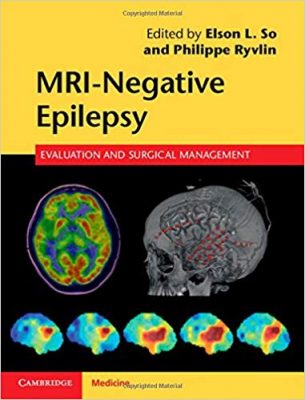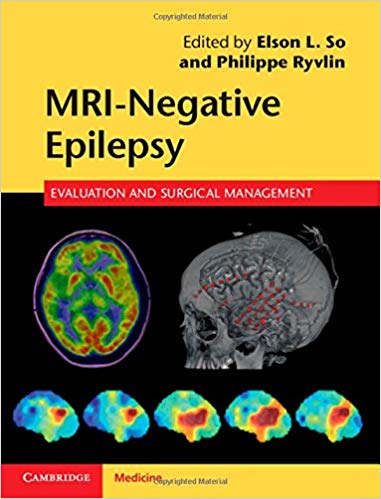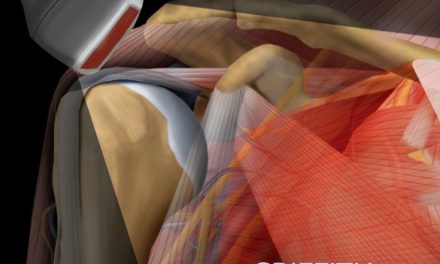 Editors: Elson L. So, MD and Philippe Ryvlin, MD
Editors: Elson L. So, MD and Philippe Ryvlin, MD
Publisher: Cambridge University Press – 246 pages
Book Review by: Nano Khilnani
It is challenging to find the locations of seizures in MRI-negative epilepsy patients, unlike in cases with MRI-positive epilepsy. This being the case, it is difficult as well o determine the best course of treatment. Compounding this problem is that more and more epilepsy centers worldwide are encountering patients with MRI-negative epilepsy.
With the growing number patients not being able to be helped with treatments, specialist clinicians are sharing in professional journals what they’ve learned about pre-surgical evaluation and post-surgical outcomes. This sharing can help colleagues – who have less information and knowledge – to better evaluate and treat their patients with MRI-negative epilepsy.
One form of knowledge-sharing is through books. And this book is one instance of imparting new information gathered about MRI-negative epilepsy to those seeking answers to many specific unanswered questions.
Forty-one specialists in neurology and related fields, from all over the United States and 11 other countries – Australia, Austria, Canada, Czech Republic, France, Germany, India, Japan, South Korea, Switzerland, and the United Kingdom – authored the chapters of this book.
We list below the titles of the 20 chapters of this book to provide you a broad overview:
- Scope and implications of MRI-negative refractory focal epilepsy
- Seizure semiology and scalp EEG in MRI-negative refractory focal epilepsy
- Clinical and advanced techniques for optimizing MRI in refractory focal epilepsy
- PET in MRI-negative refractory focal epilepsy
- Advanced SPECT image processing in MRI-negative refractory focal epilepsy
- MEG and magnetic source imaging in MRI-negative refractory focal epilepsy
- Electric source imaging in MRI-negative refractory focal epilepsy
- Functional MRI in MRI-negative refractory focal epilepsy
- Multimodality image co-registration for MRI-negative epilepsy surgery
- Subdural electrode implantation and recording in MRI-negative epilepsy surgery
- Depth electrode and stereoelectroencephalography in MRI-negative epilepsy
- Ultraslow and high frequency recordings in MRI-negative refractory focal epilepsy
- Cortical mapping in MTI-negative epilepsy surgery
- Localization and surgery in MRI-negative temporal lobe and temporal-plus epilepsy
- Localization and surgery in MRI-negative frontal lobe epilepsies
- Localization and surgery in MRI-negative posterior cortex epilepsies.
- MRI-negative refractory focal epilepsy in childhood
- Surgical approaches and techniques in MRI-negative focal epilepsy
- Histopathology findings in MRI-negative focal epilepsy
- Neuropsychological issues in MRI-negative focal epilepsy surgery: outcomes and evaluation
Why should you the clinician or researcher on epilepsy buy this book? For the following reasons that the editors themselves – Drs. Elson So and Philippe Ryvlin – have itemized:
- This book is a collation and integration of the fast-evolving state of the art and science of evaluation and surgical management of MRI-negative epilepsy
- The contents of this book are organized by diagnostic and treatment options and approaches, and by the type of refractory epilepsy
- Contributors to this book are experts in their respective areas, with recognized research investigations and clinical experience in them
- Each diagnostic technique and surgical approach discussed in this book has been critically appraised for its value and limitations
- Clinical relevance of the material in this book is enhanced by patient cases, with many images provided to illustrate salient points in each chapter
This is an authoritative, collaborative, extensive, and substantive book on MRI- negative epilepsy.
Editors:
Elson L. So, MD is Professor of Neurology, Epilepsy and EEG at Mayo Clinic College of Medicine in Rochester, Minnesota.
Philippe Ryvlin, MD is Professor of Neurology and Head of the Department of Clinical Neurosciences at CHUV (Lausanne University Hospital) in Lausanne, Switzerland.







